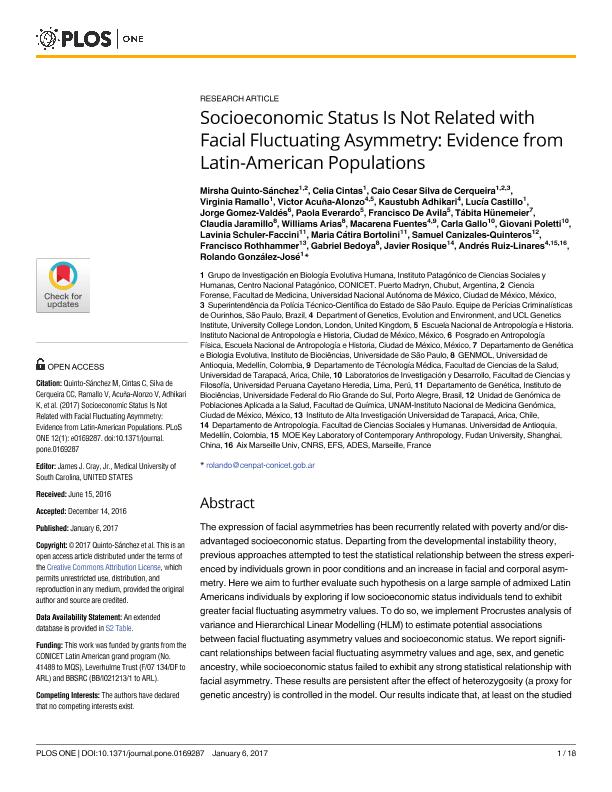Artículo
Socioeconomic Status Is Not Related with Facial Fluctuating Asymmetry: Evidence from Latin-American Populations
Quinto Sanchez, Mirsha Emmanuel ; Cintas, Celia
; Cintas, Celia ; Silva de Cerqueira, Caio Cesar
; Silva de Cerqueira, Caio Cesar ; Ramallo, Virginia
; Ramallo, Virginia ; Acuña Alonzo, Victor; Adhikari, Kaustubh; Castillo, Lucía Daniela
; Acuña Alonzo, Victor; Adhikari, Kaustubh; Castillo, Lucía Daniela ; Gomez Valdés, Jorge; Everardo, Paola; De Avila, Francisco; Hünemeier, Tábita; Jaramillo, Claudia; Arias, Williams; Fuentes, Macarena; Gallo, Carla; Poletti, Giovani; Schuler Faccini, Lavinia; Bortolini, Maria Catira; Canizales Quinteros, Samuel; Rothhammer, Francisco; Bedoya, Gabriel; Rosique, Javier; Ruiz Linares, Andrés; González José, Rolando
; Gomez Valdés, Jorge; Everardo, Paola; De Avila, Francisco; Hünemeier, Tábita; Jaramillo, Claudia; Arias, Williams; Fuentes, Macarena; Gallo, Carla; Poletti, Giovani; Schuler Faccini, Lavinia; Bortolini, Maria Catira; Canizales Quinteros, Samuel; Rothhammer, Francisco; Bedoya, Gabriel; Rosique, Javier; Ruiz Linares, Andrés; González José, Rolando
 ; Cintas, Celia
; Cintas, Celia ; Silva de Cerqueira, Caio Cesar
; Silva de Cerqueira, Caio Cesar ; Ramallo, Virginia
; Ramallo, Virginia ; Acuña Alonzo, Victor; Adhikari, Kaustubh; Castillo, Lucía Daniela
; Acuña Alonzo, Victor; Adhikari, Kaustubh; Castillo, Lucía Daniela ; Gomez Valdés, Jorge; Everardo, Paola; De Avila, Francisco; Hünemeier, Tábita; Jaramillo, Claudia; Arias, Williams; Fuentes, Macarena; Gallo, Carla; Poletti, Giovani; Schuler Faccini, Lavinia; Bortolini, Maria Catira; Canizales Quinteros, Samuel; Rothhammer, Francisco; Bedoya, Gabriel; Rosique, Javier; Ruiz Linares, Andrés; González José, Rolando
; Gomez Valdés, Jorge; Everardo, Paola; De Avila, Francisco; Hünemeier, Tábita; Jaramillo, Claudia; Arias, Williams; Fuentes, Macarena; Gallo, Carla; Poletti, Giovani; Schuler Faccini, Lavinia; Bortolini, Maria Catira; Canizales Quinteros, Samuel; Rothhammer, Francisco; Bedoya, Gabriel; Rosique, Javier; Ruiz Linares, Andrés; González José, Rolando
Fecha de publicación:
01/2017
Editorial:
Public Library of Science
Revista:
Plos One
ISSN:
1932-6203
Idioma:
Inglés
Tipo de recurso:
Artículo publicado
Clasificación temática:
Resumen
The expression of facial asymmetries has been recurrently related with poverty and/or disadvantaged socioeconomic status. Departing from the developmental instability theory, previous approaches attempted to test the statistical relationship between the stress experienced by individuals grown in poor conditions and an increase in facial and corporal asymmetry.Here we aim to further evaluate such hypothesis on a large sample of admixed Latin Americans individuals by exploring if low socioeconomic status individuals tend to exhibit greater facial fluctuating asymmetry values. To do so, we implement Procrustes analysis of variance and Hierarchical Linear Modelling (HLM) to estimate potential associationsbetween facial fluctuating asymmetry values and socioeconomic status. We report significant relationships between facial fluctuating asymmetry values and age, sex, and genetic ancestry, while socioeconomic status failed to exhibit any strong statistical relationship with facial asymmetry. These results are persistent after the effect of heterozygosity (a proxy for genetic ancestry) is controlled in the model. Our results indicate that, at least on the studied sample, there is no relationship between socioeconomic stress (as intended as low socioeconomicstatus) and facial asymmetries.
Archivos asociados
Licencia
Identificadores
Colecciones
Articulos(IPEEC)
Articulos de INSTITUTO PATAGONICO PARA EL ESTUDIO DE LOS ECOSISTEMAS CONTINENTALES
Articulos de INSTITUTO PATAGONICO PARA EL ESTUDIO DE LOS ECOSISTEMAS CONTINENTALES
Citación
Quinto Sanchez, Mirsha Emmanuel; Cintas, Celia; Silva de Cerqueira, Caio Cesar; Ramallo, Virginia; Acuña Alonzo, Victor; et al.; Socioeconomic Status Is Not Related with Facial Fluctuating Asymmetry: Evidence from Latin-American Populations; Public Library of Science; Plos One; 12; 1; 1-2017; e0169287
Compartir
Altmétricas



